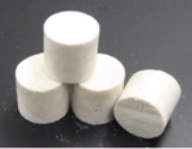Oct 21 2010
Amid ongoing concern about plastic waste accumulating in municipal landfills, and reliance on imported oil to make plastics, scientists are reporting development of a new ultra-light biodegradable foam plastic material made from two unlikely ingredients: The protein in milk and ordinary clay.
The new substance could be used in furniture cushions, insulation, packaging, and other products, they report in the ACS' Biomacromolecules, a monthly journal.
 Lighter-than-a-feather, this new material, made from milk protein and clay, could become a new bio-degradable substitute for traditional foamed plastics.
Lighter-than-a-feather, this new material, made from milk protein and clay, could become a new bio-degradable substitute for traditional foamed plastics.
David Schiraldi and colleagues explain that 80 percent of the protein in cow milk is a substance called casein, which already finds uses in making adhesives and paper coatings. But casein is not very strong, and water can wash it away. To beef up casein, and boost its resistance to water, the scientists blended in a small amount of clay and a reactive molecule called glyceraldehyde, which links casein's protein molecules together.
The scientists freeze-dried the resulting mixture, removing the water to produce a spongy aerogel, one of a family of substances so light and airy that they have been termed "solid smoke." To make the gossamer foam stronger, they cured it in an oven, then tested its sturdiness. They concluded that it is strong enough for commercial uses, and biodegradable, with almost a third of the material breaking down within 30 days.
Source: http://portal.acs.org/